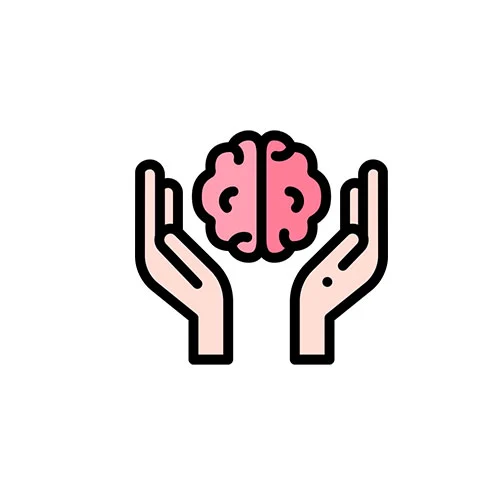01
Multi-disciplinary mental health, special needs and autism clinic
02
Licensed by Qatar’s Ministry of Public Health
03
Expert care in a welcoming environment
04
Tailored and personalized therapy plans
We offer the highest quality care.
Explore a world of personalized therapy plans and programs and discover the transformative support you've been searching for. MIND is your ultimate destination for specialized care and empowerment for special needs, mental health, and more.
Early Intervention Program, Daily Learning Support, Social Skills, and more
Learn why we’re the first choice for individuals and families in Qatar!
Get started today!

Call our office
Get in touch with our office, and our friendly staff will collect your contact information and request any background documents that may be necessary ahead of the Intake Appointment.

Schedule an Intake Appointment
We’ll work with you to find a suitable time that fits you or your child's schedule. During this initial consultation with our intake specialists, we’ll discuss your concerns, gather relevant case history information, and engage in a thorough discussion of any observations made.

Start your therapy journey
After your intake appointment, our team of experts will provide you with detailed feedback within 24-48 hours and suggest a customized therapy plan or assessment process.

Experience the power of result-driven care at its finest
Unlock targeted change and remarkable improvement with our personalized approach to therapy and daily
programs.
You are also invited to request your Intake Appointment here.
Welcome to Mind Institute
We adopt a collaborative and multidisciplinary approach across all of our services. Our team of QCHP-licensed therapists, special educators, and support specialists work collectively to provide personalized and evidence-based interventions tailored to meet the unique needs of each person we serve.
1
Your first choice since 2017
- 1:1 therapy services for children and adults
- Personalized and tailored support for real results
- Group therapy and social skills programs
- Comprehensive range of assessments
Why choose us?
Expertly-licensed team
Licensed by Qatar’s Ministry of Public Health (MOPH), each of our therapists are QCHP-licensed professionals that bring a wealth of expertise and knowledge to the table. With years of experience in their respective fields, they are dedicated to guiding you towards positive outcomes and empowering you on your therapy journey.
State-of-the-art facilities
Experience the pinnacle of cleanliness, spaciousness, and comfort at MIND, where our facilities have been meticulously crafted in close collaboration with renowned experts from the U.K. Our therapy rooms are flooded with natural light, creating a bright and inviting atmosphere, and our waiting rooms boast a comfortable and welcoming environment. With our facilities and resources unmatched in Qatar, we create an atmosphere conducive to your success.
Comprehensive Services
Experience holistic care through our multidisciplinary approach. Whether you require support for special needs, autism, or mental health, we provide 1:1 and group therapy services, comprehensive assessments, and customized programs. Our services are available in English, Arabic, French, and more, catering to your preferred language.
What our clients say
American Community School
“The level of professionalism and dedication that Mind Institute confers to each case study is what has drawn me to choose this provider as our preferred chosen institute to work with here in Doha. Firstly, it is very reassuring to have Ms. Azza on the other side of the phone line, discussing cases and referrals. I appreciate the fact that I can follow up with the psychologists who have conducted assessments with our students, to clarify doubts. We value and we trust Mind Institute and all of its professionals. It is an institute that is abreast of the newest interventions in the field of special educational needs. The PsychEd reports from the Mind Institute are thoroughly carried out.”
American School of Doha
“At the American School of Doha, it gives us great pleasure to provide a testimonial for the Mind Institute and Mind Center for Special Needs (MIND). Over the past few years, MIND has demonstrated exceptional collaboration and care, not only with our school’s divisional leadership but also with our classroom teachers and families. Each experienced, qualified, and licensed therapist is matched with a student based on his/her individualized needs to ensure a cohesive support structure for the child. MIND has further supported our school’s mission and learning community by providing teacher trainings and workshops, as well as participating in an expert panel on anxiety. We are thrilled with our ongoing partnership and look forward to continuing our trusted collaboration.”
J.R.
“My children have been receiving therapy services at the Mind Institute since 2020. Our children have made amazing progress under their care and we are so grateful for their ongoing support. We have received a wide variety of intervention services, including speech therapy, occupational therapy, play therapy, and social skills groups both in the U.S. and at other centers in Qatar, and we can confidently say that the standard of care at the Mind Institute is world class and it is the best center in Qatar for supporting children with additional needs. I recommend the Mind Institute without reservations. The center has amazing therapists, management, and administration all of whom work together as a team to make sure your family and your children are supported at the center, at school, and at home. There is nowhere that will do more to help your children thrive and reach their full potential while accepting them as their authentic selves. Our children's lives will forever be better due to services they received at the Mind Institute.”
I.A.
“A beautiful center that takes care of children and helps develop the child’s skills and self-reliance significantly!”
King’s College Doha
“It is always reassuring to work with professionals who strive to understand and meet the needs of our children consistently and effectively. It has been a pleasure to collaborate and work together with the therapists at Mind Institute in order to ensure that our children are making more and more progress. The staff at Mind Institute are not only well educated and experienced but also caring, ambitious and resilient in ensuring that children meet their full potential.”
V.B.
“Professional, passionate and caring! Highly recommend them.”
S.A
“If you are looking for a professional and caring center to work with you closely to develop your child’s skills and abilities, then MIND is the one. My ASD daughter has been going there for more than two years now and I have continuously been satisfied with all her progress. They know how to identify the child’s struggles, structure a development plan and address the issues accordingly. The improvement we have seen in her is amazing. She is more independent and confident now. She is going to a mainstream school two months from now and I cannot be more grateful. The whole team are hearty and care for the kids in the center. I drop my daughter there every day with confidence, knowing that she is in good hands. MIND has been a lovely part of our family and we are full of gratitude for all their efforts.”
A.H.A
“The center provides services for all children, not only for people with special needs, but also for children with learning difficulties. I noticed clear progress for my daughter and great development in her communication. She was helped by an occupational therapist, a speech therapist, a behavioral specialist, and psychological counseling for 3 years, and thank God, with the efforts of the specialists, she became behaviorally and academically superior in school.”
N.J.
“The staff are very friendly and they are extremely professional. I would recommend this center for all special needs children, it is the best in Qatar.”
S.A.
“I am so glad my daughter has joined Mind Institute and that is because of the improvement we see and feel in her overall development. We were so worried and concerned before she joined. But they have amazed us with all the intervention. She has massively developed and we are so pleased.”


